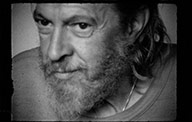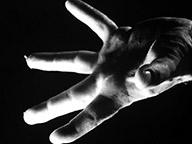
|
/ films /
|
 |
Oncle Bernard
– A Counter-Lesson in Economics
documentary, 2015, 16 mm/HD,
b&w, 79 min, Québec-Catalunya
Economist Bernard Maris,
a.k.a. "Oncle Bernard", was killed during the
Charlie Hebdo shooting, on January 7, 2015. This
fascinating interview with him was filmed in
March 2000 as part of the documentary Encirclement
– Neoliberalism Ensnares Democracy. Frank
and unvarnished, this is a true "counter lesson
in economics" in which the director gives centre
stage to Maris' vibrant, incisive, and
mischievous words of dissent. Maris strikes at
leisure, unleashing hard-hitting truths that
challenge the dogmas that are incessantly
rehashed by the vibrant choir enslaved to the
"science" of Economics. With his wit, eloquence,
and erudition, and his prodigious capacity to
distill complex issues and make the most arduous
subject matters exciting, "Oncle Bernard"
unveils his courageously original ideas over the
course of the interview – ideas that are all the
more precious in this era of intellectual
resignation and economic austerity.
|
|
 |
Prends
garde à la douceur des choses
essay, 2014, HD, colour, 2
min., Québec
A sequence shot filmed in
L’Avenir, Québec, that is thought-provoking... A
film made in the context of Traces du futur
(filmmakers that were selected at Visions du
Réel in the past twenty editions celebrate the
Festival's anniversary in 2014 by each making a
short film in which they expose their view of
the future).
|
|
 |
Encirclement –
Neo-Liberalism Ensnares Democracy
documentary, 2008, 16mm/HD,
b&w, 160 min., Québec
Drawing upon the thinking and
analyses of renowned intellectuals, this
documentary sketches a portrait of neo-liberal
ideology and examines the various mechanisms
used to impose its dictates throughout the
world. Neo-liberalism’s one-size-fits-all dogmas
are well known: deregulation, reducing the role
of the State, privatization, limiting inflation
rather than unemployment, etc. In other words,
depoliticizing the economy and putting it into
the hands of the financial class. And these
dogmas are gradually settling into our
consciousness because they’re being broadcast
across a vast and pervasive network of
propaganda. But behind the ideological
smokescreen, behind the neat concepts of natural
order and the harmony of interests in a free
market, beyond the panacea of the "invisible
hand," what is really going on?
|
|

|
Too Much Is Enough
documentary, 1995, 16mm,
colour and b&w, 111 min., Québec
Too Much Is Enough
gives voice to Gilles Groulx (1931-1994), a.k.a.
"le lynx inquiet", one of Québec's most
outsanding and original filmmakers – and
certainly the most politicized and censored.
Tragically, Groulx's career was cut short in
1981 after he suffered a head trauma in an
automobile accident that inexorably isolated him from
his peers. Groulx was soon forgotten. Between
1989 and 1994, Richard Brouillette met regularly
with Gilles Groulx, recording the filmmaker's
thoughts on his work and life. The film combines
sober images from these sessions with excerpts
from Groulx's films and some of his paintings,
as well as archival footage.
|
|
 |
Carpe diem
essay, 1995, 16mm, b&w, 5
min., Québec
(segment of the collective
feature-length film Un film de cinéastes)
"One can't write a film, it
has to be seized."
A short manifesto, inspired by Dziga Vertov (We)
and Gilles Groulx (Propos sur la
scénarisation).
|
|

